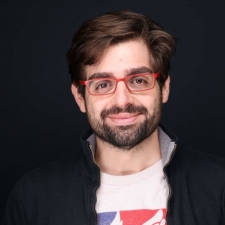Founded in 2019 by industry veterans, SuperPlay has since released two mobile titles, Domino Dreams and Dice Dreams.
The latter was released in October 2019 but wasn't an instant hit. However, throughout its year of soft launch, things gradually improved, and today, the game has become a huge success, frequently ranking in the top charts.
According to AppMagic data estimates, Dice Dreams has now accumulated more than $300 million globally from player spending - and it also generates revenue from in-game ads, too.
We spoke with Superplay's CPO and Co-Founder, Elad Drory, about the studio's journey so far, what the development phase of Dice Dreams was like, and the key to success.
We also discussed SuperPlay's marketing strategy, including the use of celebrities, tips for retaining players, and what to expect next for both Dice Dreams and Domino Dreams.
PocketGamer.biz: Can you tell us a little about how you got started in the games industry and how you ended up at Superplay?
Elad Drory: I’ve always loved games, and when I found out I could make them for a living, I made it my mission to enter the industry. 12 years ago, I took a pay cut to join a small studio called SideKick Games, where I did QA on Kinect games - to date, that was the most physically demanding job I’ve held in my life.
After a couple of years, I got into game design and continued into more lead roles, first at Crazy Labs and then at Rovio. Through some combination of luck and skill, every game I worked on was a bit better and more successful than the last.
Then came SuperPlay. Five years ago, I met Eyal and Gilad at a coffee shop, and they told me they wanted to start a company and had an idea for a dice game.
We didn’t know each other beforehand, but I was excited by the idea, so I sent them a pitch deck on how I’d approach the design and prototype for their game. It clicked for all of us, and we decided to hit the road together. That original pitch deck eventually transformed into Dice Dreams.
Dice Dreams was tech launched within six months of starting the company, globally launched six months after that, and we’ve been growing ever since.Elad Drory
What was the development process of Dice Dreams like? Are there any big challenges the team had to overcome? And what do you think has been the key to success for that title?
We had very big aspirations with Dice, and all of these came with design challenges. At their core, we want our games to create memories and emotional connections for our players, both through the social loops of the game and through in-game characters that make the game feel alive and welcoming.
Nailing the right feeling for our Peon characters took a while, but we kept working on them until we fell in love with them ourselves, and I guess when the team falls in love, the players do too.
Another design pillar for Dice was that we wanted the world to be much more seamless than other games in the genre.
I never liked how separated the core and meta were in comparable games, and in Dice, we wanted the gameplay and kingdom to live on the same screen so that players can experience both their own and their friends’ kingdoms in a more immersive way.
This required creating the world in 3D, optimising for that, nailing the physics of the Dice, and the behaviour of the Peons.
So there were definitely challenges, and looking back, it feels like they were big, but luckily, we have a great team.
Everyone executed amazingly and in record time. Dice Dreams was tech launched within six months of starting the company, globally launched six months after that, and we’ve been growing ever since.
Given some of the market challenges we are seeing what essential tips do you have for retaining players? How do you approach keeping players engaged with content? And what are some of the biggest challenges in keeping a game alive in the long term?
We look at this in layers, which can roughly translate to different retention days. First, you’ll never get players past D1 to D7 without a super satisfying and tight core loop.
Juicy, delightful interaction, clear UX, minimal friction, and a sprinkle of “soul” to fall in love with the world. These are key to the early days of the player.
In later days, it’s crucial to spread out your content and features to keep players engaged. It’s hard to “hold back” with features you worked hard on.
The instinct is to want to put it in players’ hands early, but if you grit your teeth and only unlock big features in days 14, 30, or even later, it can be such a big moment for players that ultimately makes the game much more engaging and carries you to that D90 mark and high ROAS progression.
And, of course, throughout the entire lifetime of the player, we have an extremely active live ops calendar that always keeps the game fresh in terms of content and visuals.
We’ve built a lot of tools that allow us to completely change the game remotely, not just visually but also functionally. We want players to always feel like there are exciting things happening in the game, and every time one chase ends, they’re already in the middle of the next chase.
The Domino Dreams team has been hard at work for two years, and the game is now showing amazing numbers that will allow us to scale up significantly.Elad Drory
We’re seeing a change in how games are marketed and there’s a big trend toward getting celebrities involved. Dice Dreams has had ads featuring the likes of Eva Longoria and Kate Beckinsale. How do these types of opportunities come up, and what benefits do you see from having popular and familiar faces there?
This one isn’t my wheelhouse, so I’ll mostly gush about our insane marketing team. All of our marketing is super data-driven, and we create and test a ton of creative variants on many different channels. It’s a super lean team that manages to juggle dozens of marketing initiatives at once.
These past years, we’ve had a lot of success using influencers and celebrities. We’ve scaled this over time from smaller territories and local celebrities to huge worldwide stars like Eva and Kate.
For big campaigns like these, we create a mass of different creatives, then we fire on all cylinders with many different channels simultaneously. Obviously, this also requires some pretty deep pockets, but we’re fortunate to have reached that level of scale today.
Superplay has seen success with not just Dice Dreams but also Domino Dreams. What does the future for this title look like, and what is the theme of ‘dreams’? Is this something we can expect to see expanded on in any future titles?
We’re super proud of both our games and the universe we’ve built. The Domino Dreams team has been hard at work for two years, and the game is now showing amazing numbers that will allow us to scale up significantly.
We're definitely working on more updates; our games are never finished! Both Dice and Domino studios have very exciting plans for 2024, and we’re always looking for new ways to delight players.
As for the “Dreams” universe and our lovable Peons, I definitely think we’ll continue exploring the brand and world in future games, although we’re very data-minded when it comes to marketability.
The Peons work really well for Dice and Domino, but we’ll only use them if it feels right for the next type of game, and the data backs it up. The audience comes first.
And what about Superplay as a whole? You already have studios in multiple locations, but is there any possibility of further expansion on the horizon? What comes next for the studio?
Oh yes, we’re still growing strong, and we’re going to expand both in terms of headcount and physical location. The two existing studios have big plans, and we’re starting more projects as well.
These new projects will start with small teams, just as we started Dice and Domino, because I think that’s the best way to grow new ideas and games.
Fortunately, we now have the advantage of a super robust tech stack that lets us spin up new games much faster, with all of our social and live ops capabilities already in place. So, I believe you’ll be seeing new and exciting games pretty soon.





















